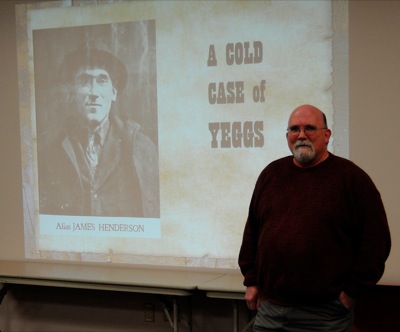Friday, March 4th, 2016
Speaker shares tale of long ago organized crime
By Ed Gebert

Photo by Ed Gebert/The Daily Standard
John Carnes, Allen County Museum curator, on Thursday evening wove a true tale of an early 20th century crime spree, local history, family history and a group of professional criminals known as yeggs.
ST. MARYS - A true tale of an early 20th century crime spree from a group of organized criminals known as yeggs was interwoven on Thursday with family and local histories of Auglaize and Allen counties.
Allen County Museum Curator John Carnes spoke at the St. Marys Community Public Library about the yeggs and their connection to his family.
The story began with the 1901 murder of Carnes' great-grandfather, John F. Shively, a Kossuth saloon operator, and wound through a number of crimes, including an attempted bank robbery in Minster, a blown-up safe in Wilmington and a home-invasion robbery near Cridersville, Carnes said in the talk sponsored by the Auglaize County Historical Society. The spree was said to be tied to the group of yeggs, a term that describes professional criminals, especially ones who work with explosives.
For Carnes, learning about the yeggs started with a bit of family history he picked up as a boy from his grandmother.
"Growing up, I'd go upstairs at her house and in the back room were these two portraits" he remembered. "I asked her about them one day, and she told me that the one was her father and what had happened. She said that a posse had gone after the killers and never found them, and that was the end of it. Of course, as a kid, I had Wild West sort of notions, and it's not too far from that. It always stayed with me."
The story follows accounts of a group of criminals and the havoc they caused while trying to steal from area businesses and residences. The discovery of a newspaper account from 1904 opened a whole new set of doors for Carnes.
"Initially I started writing up a family history, and this was a simple story as part of the family history but it's gone beyond simple," he said. "I still have a lot more to dig up, hopefully."
Carnes's account of the yeggs gives a less peaceful picture of the area than most had learned.
"There was definitely organized crime involved in not just Allen County and the Lima area, but Auglaize County, Mercer County and beyond," he said. "There was an organized network of these yeggs, and they were pretty active until the World War I time frame, and then they were replaced by a different type of criminal, the ones of the late '20s and early '30s that were pretty prevalent in this area too."
The mix of family history, area history and unsolved crimes draws in Carnes.
"The story fascinates me because I have a personal stake in it," he admitted. "It was good to see that in a lot of the articles I found, the local authorities, whether police departments or sheriff's departments were on their game. They knew about these guys, and they tried to keep watch on them. That was kind of a surprise for that time frame. There were definite professionals in the law enforcement business back in the 1900s."
The Shively murder is more than a 115-year-old cold case for Carnes and is a truthful account by his grandmother and the incident that ended her relationship with her father.
"When I talked to her about him, she was so sad when she was talking about him," Carnes related. "She only had one memory of him, and that was sitting on the bar as a little girl, and men would come up wanting their lunch pails filled with beer after the work day. It was a German community, and that was a traditional thing to do, to have the beer with the evening meal. She remembered sitting on the bar, watching her father fill these pails. That was her only memory of him."






